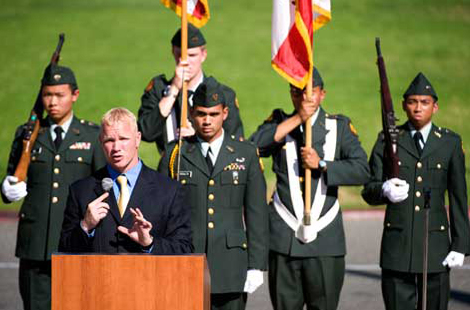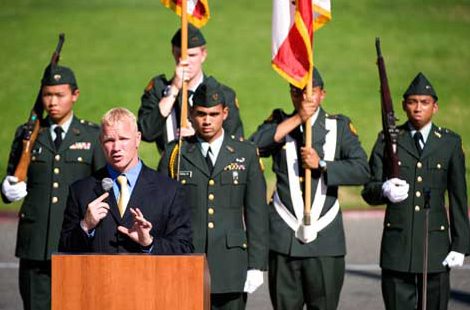Sociology undergrad David Curry is UROP's researcher of the month

Sociology undergrad David Curry is UROP's researcher of the month
- January 12, 2011
- Marine Corps veteran and current UCI Veterans Student Union president offers advice on pursuing undergraduate research at UCI
-----
 Being involved in research has given David Curry the opportunity to apply what he learns in his classes to real-world issues. A veteran
of the U.S. Marine Corps with two tours of duty in Iraq behind him, the sociology
undergraduate knows what it’s like to be recruited to a cause and see it through with
pride. His work on reintegrating combat veterans back to civilian life has given him
a glimpse of how commitment and effort can make a difference in people’s lives. The
current president of UCI's Veterans Student Union (VSU), Curry plans to attend graduate school before becoming an author and professor
of military sociology. For his exceptional passion and dedication, David was awarded
UCI's 2010 Chancellor’s Award for Excellence in Undergraduate Research from the School
of Social Sciences and was selected as the Undergraduate Research Opportunities Program (UROP) January Researcher of the Month. Below, Curry discusses his research interests
and offers fellow anteaters advice on finding a research passion.
Being involved in research has given David Curry the opportunity to apply what he learns in his classes to real-world issues. A veteran
of the U.S. Marine Corps with two tours of duty in Iraq behind him, the sociology
undergraduate knows what it’s like to be recruited to a cause and see it through with
pride. His work on reintegrating combat veterans back to civilian life has given him
a glimpse of how commitment and effort can make a difference in people’s lives. The
current president of UCI's Veterans Student Union (VSU), Curry plans to attend graduate school before becoming an author and professor
of military sociology. For his exceptional passion and dedication, David was awarded
UCI's 2010 Chancellor’s Award for Excellence in Undergraduate Research from the School
of Social Sciences and was selected as the Undergraduate Research Opportunities Program (UROP) January Researcher of the Month. Below, Curry discusses his research interests
and offers fellow anteaters advice on finding a research passion.
Q: What is your specific area of research?
A: My research emphasis is on military sociology/social psychology as it relates to military transition and combat reintegration from the battlefield back to civilian life. My faculty mentors are Caesar Sereseres, political science and international studies associate professor, and David Snow, sociology professor.
Q: When and how did you first get involved in research?
A: I was a panelist for an Iraq Veterans forum as a newly admitted transfer student and afterward I was approached regarding my research interests as it related to my military experiences.
A: How has research enhanced your education?
Q: Being involved in research has given me the opportunity to take the major curriculum
that I have learned beyond the classroom and apply it to the pursuit of seeking solutions
to real-world problems such as those facing the military and veterans population.
Q: What has been your favorite experience with research?
A: To date, my best experiences have been visiting various non-profit agencies that are
providing innovative ways of assisting veterans in making a successful transition
to military life such as the Wounded Warrior Project Track program in Jacksonville,
Florida. Experiences such as this have given me a glimpse of what is possible with
commitment and coordinated effort.
Q: What are your future plans and how has being involved in research helped prepare
you to meet your goals?
A: Upon graduating from UCI, I intend to enroll at USC and pursue a master’s in social work with an emphasis in military social work. From there, I would like to attend the University of Maryland-College Park for doctoral studies in military sociology. My career plans are to be an author and professor of military sociology in addition to being a program analyst/consultant for state and federal veterans programs.
Q: What advice would you give to a student interested in pursuing a faculty-mentored undergraduate research project or creative activity?
A: Use an academic course that you really enjoyed as a launching pad for your area of
interest. If you can learn the fine details about a topic and you enjoy the subject
more than when you started, you are probably on the right track. In addition to the
value it adds to your undergraduate academic experience, research can potentially
open up the door to many possibilities and opportunities that you may not have thought
were possible that will greatly shape your future.
-photo by Daniel Anderson, University Communications
-----
Would you like to get more involved with the social sciences? Email us at communications@socsci.uci.edu to connect.
Share on:
Related News Items
- Careet RightNotes from a future professor
- Careet RightCan Opportunity Zones ever meet their poverty-fighting promise?
- Careet RightFei Yuan named one of ten global China Times Young Scholar Fellows
- Careet Right'Wired for Words: The Neural Architecture of Language,' an excerpt
- Careet RightEveryone's looking for a partner who has these 3 traits, according to research


